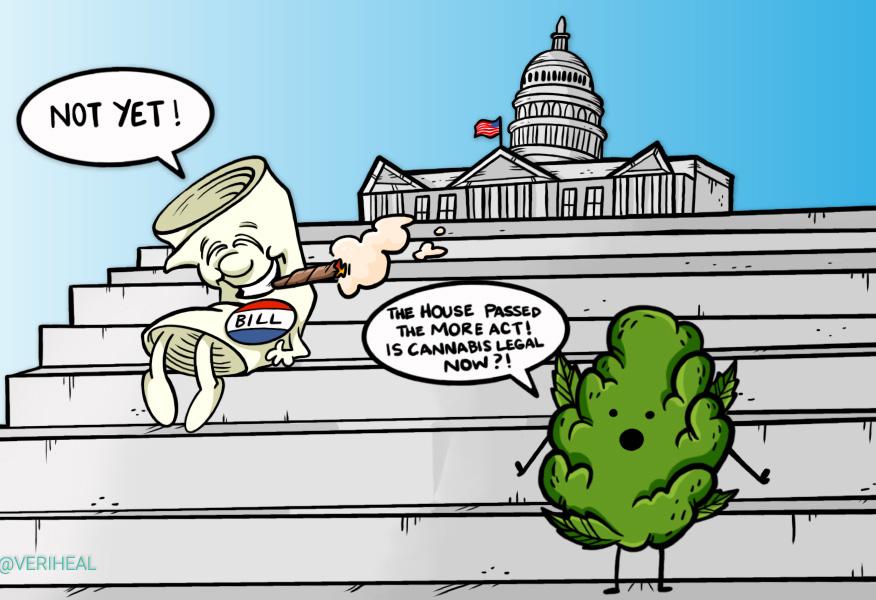
3 minute read
All Hands On Deck Needed To Pass The MORE Act!
from Munkey Biz Issue 15
by HAPPY MUNKEY
By Kenny Mack
One thing I appreciate about the failed real estate developer who used to live in the White House (I can’t remember his name) is that he motivated a whole bunch of people to care about politics. Now the elections are all over and there’s a new President and a new Congress in Washington, I need those people to keep that same energy because getting rid of what’s-his-name and putting Democrats in charge of the whole federal government was just the warm-up. The ultimate goal of legalizing cannabis nationwide in a way that honors the culture, the plant, and the pioneers who risked everything to create this industry will take a coordinated Georgia Senate runoff-style campaign in medical and recreational states all over the country.
Advertisement
Off the top, it’s important to keep in mind that the type of people who run for office, win elections, and build careers as lawmakers probably haven’t spent much time around the herb game. For the most part, they know that they don’t know – and they’re usually happy to hear from experts who can help them gain a better understanding of how it works. The problem with that is the people who get to meet and speak with elected officials are almost always the kind of insiders, lobbyists, and public relations flacks who are hired to represent the interests of big corporate cannabis and its industry trade groups.
These are the same (mostly) white maleowned companies who dominate medical and recreational cannabis on the state level – where they’ve been able to flip their political connections into a billion-dollar head start in Washington, Colorado, California, Illinois, Massachusetts, and Michigan. All while Black and Brown business owners in those same states continue to go bankrupt trying to work through the application process. To keep this pattern from being repeated in Washington, D.C., the cannabis rights movement will need to be better organized. Luckily, we have some advantages in this fight because voters in 44 states are already on our side, and no Member of Congress is more popular than federally legalized recreational weed. In the House of Representatives, Speaker Nancy Pelosi (from the recreational state of California) passed a bill called the MORE
Act back in December. There’s a lot wrong with it, some of our friends sold us out in the process, and we will have to make it better when the time comes. But the most important thing is that she got it done. In the Senate, the math is completely crazy. Of the 50 states, medical cannabis is legal in 20, and recreational cannabis is legal in 15. In a best-case scenario where the 40 Senators from medical states and the 30 Senators from recreational states do the right thing, there should be at least 70 “yes” votes for some kind of federal legalization. Then it’s a wrap. That kind of support practically guarantees Majority Leader Chuck Schumer (from the wannabe recreational state of New York) will bring a bill to the floor of the Senate. It also stops any of the other 30 Senators from even thinking about a filibuster, and is more than enough votes to override an unlikely Presidential veto from Uncle Joe.
The real spill is that a revised and improved MORE Act is probably our best chance at an industry that doesn’t lock out legacy market providers, prioritizes licenses for Black and Brown business owners, and makes sure money is reinvested in communities most harmed by cannabis prohibition. The bill is now in the hands of the Senate Finance Committee where Chairman Ron Wyden (from the recreational state of Oregon) calls the shots, and a bi-partisan majority of the members represent more than a dozen other medical and recreational states. So let's stay on our grind. Some logical targets for the cannabis rights movement to focus on right now would be Senate Finance Committee Members Sherrod Brown and Rob Portman of Ohio, Bob Casey and Pat Toomey of Pennsylvania, Michael Bennett of Colorado, Tom Carper of Delaware, Chuck Grassley of Iowa, Mike Crapo of Idaho, Bill Cassidy of Louisiana, Debbie Stabenow of Michigan, Steve Daines of Montana, Ben Cardin of Maryland, Bob Menendez of New Jersey, Maggie Hassan of New Hampshire, Catherine Cortez Mastro of Nevada, Jim Lankford of Oklahoma, Sheldon Whitehouse of Rhode Island, John Thune of South Dakota, Mark Warner of Virginia, and Debbie Stabenow of Michigan.
Send an e-mail to info@makecannabiswork. org and we’ll forward a fill-in-the-blanks letter that any cannabis voter can use to make their voice heard.
The struggle continues...







